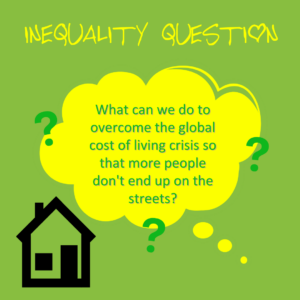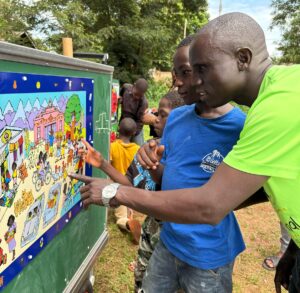The combined effects of the Covid pandemic, Russia’s invasion of Ukraine and the ongoing climate disaster have created massive inflationary pressures throughout the world. As a result Oxfam have projected that 260 million people will be pushed into extreme poverty this year alone.
This month, with the cost-of-living crisis unfolding across the world, the children S.A.L.V.E. supports in Uganda asked our world-wide supporters:
What can we do to overcome the global cost of living crisis so that more people don’t end up on the streets?
The subject produced an insightful discussion, with Philo in Uganda kicking things off by emphasising the need to combat the corruption that has dominated developing countries. Sarah in the UK questioned how corruption could be fought because it is a global issue, affecting all countries on many different levels. Ochaya, a fellow participant, proposed that countries should follow in the steps of governments that have departments that are established purposely to fight corruption.
 Interestingly, Tina advocated for a community effort: she believed that people should share what they have, doing something as simple as cooking a meal for a neighbour struggling, or letting a refugee stay in your spare room, “People need to be less selfish, the people who have a lot need to give to those who don’t have so much.” Kato in Uganda echoed this communal approach, stating that “People should form groups, start projects and support each other.”
Interestingly, Tina advocated for a community effort: she believed that people should share what they have, doing something as simple as cooking a meal for a neighbour struggling, or letting a refugee stay in your spare room, “People need to be less selfish, the people who have a lot need to give to those who don’t have so much.” Kato in Uganda echoed this communal approach, stating that “People should form groups, start projects and support each other.”
Also, debaters emphasised the importance of parents in protecting their children through the cost of living crisis. Parents, according to Odero in Uganda, should teach their children about the dangers of the street. Furthermore, Shamin in Uganda, shared that, “Parents should show equal love and consistency” to enable children to stay at home.
Contrastingly, Kamwa in Uganda favoured individual efforts, claiming that, “people should take full responsibility of their lives, because a responsible person cannot choose to live on the street.” However, with the cost of living increasing, resulting in more evictions, will some people have no choice but to live on the street?
What steps can the government take?
To prevent more individuals from ending up on the streets, the government plays a crucial role in tackling the cost of living problem through polices and effective interventions.
Several participants argued that the rich-poor divide needs to be targeted, so that systems work for the betterment of all. Dennis in the UK believed the problem with the crisis is to do with inequality and greed, and this needs to be addressed at a government policy level. Nat agreed, and saw greed as a huge driving force, but believed it would be difficult to shift this paradigm to a society of sharing wealth.
A Woodhaven school student believed the government should invest in climate friendly technology so we don’t need oil and gas as much. Nicola in the UK supported this belief, attributing the global cost of living crisis to the government’s inability to not take serious action on climate change, “I think we need to invest and focus more into renewable energy and permaculture farming to help us not to face such cost of living crises in the future”.

Various contributors emphasised the need for more employment opportunities to be provided by the government. And others, such as Bena in Uganda, wanted the government to create loan schemes and teach the benefit of these loans. This in turn could empower individuals to create employment opportunities for themselves, which could deter them from having to live on the streets.
Patience in Uganda looked at the importance of taxes, stating the need for tax cuts on essential basic needs, so the most vulnerable can be less affected. While Daisy in the UK questioned, “why are the rich getting richer and the poor getting poorer?”, believing that “more taxes for the rich” were therefore necessary.
This debate has brought forward a number of ways, individually, communally, and through government support that the cost of living crisis can be addressed to prevent people from ending up on the streets. Finally, Mutonyi Jenfler in Uganda poignantly said, “The world should work together in unity to address this crisis”, suggesting a united approach to addressing a challenge which is encompassing the world and bringing people to the streets.





0 Comments